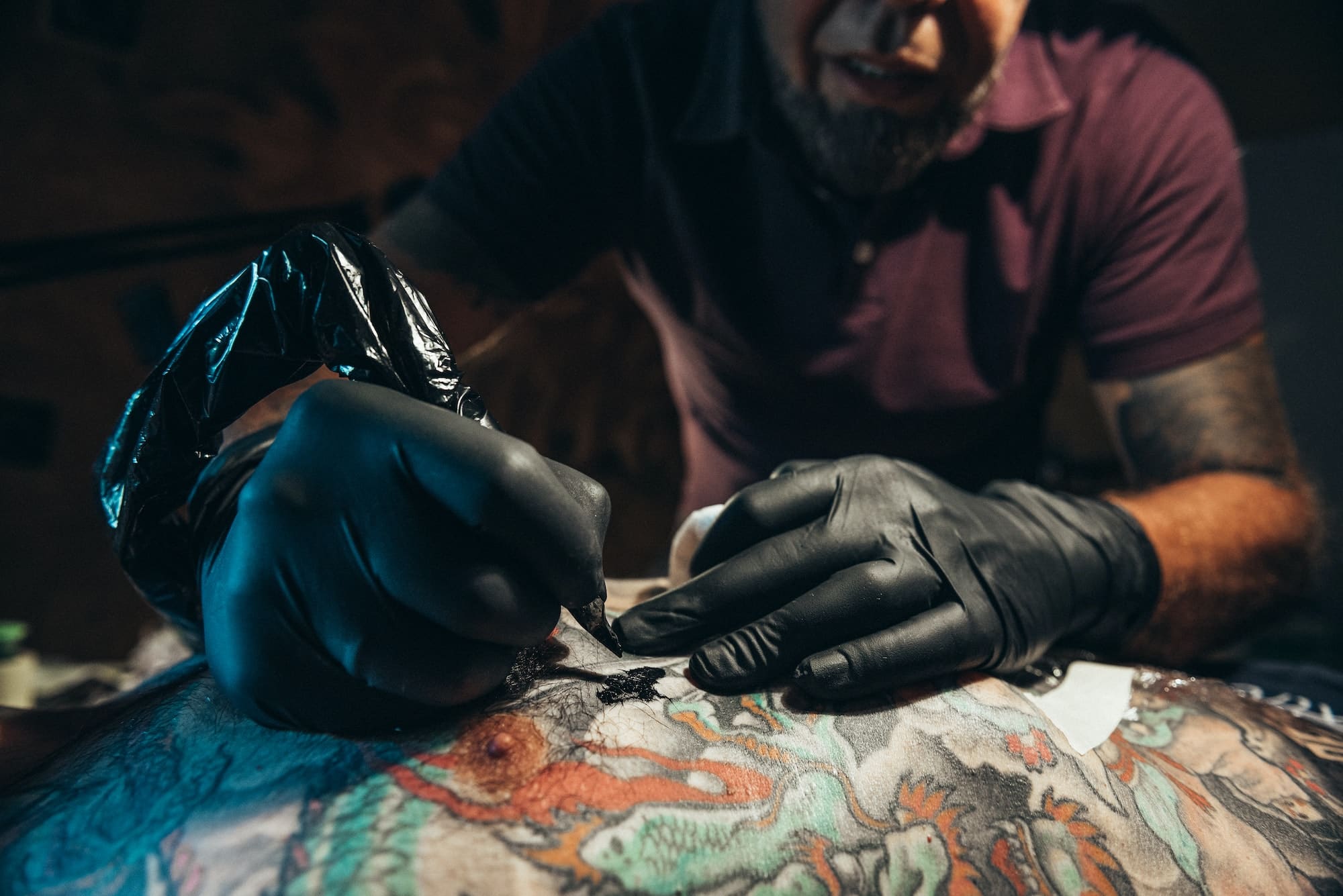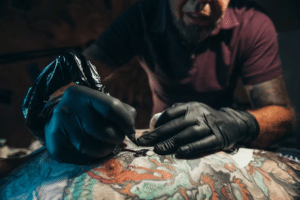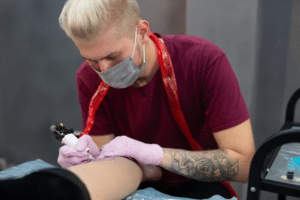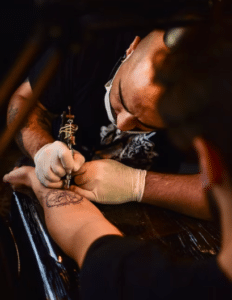
Source: pexels.com
Getting a tattoo is a big decision. It’s important to be prepared before you go through with it.
A tattoo is a permanent form of body art that is created by inserting ink into the skin. The ink is deposited beneath the surface of the skin, where it remains permanently. Tattoos are popular among people of all ages and backgrounds and can be used to express a variety of different ideas or sentiments.
Getting your skin in the best condition before getting a tattoo might be your first concern. Remember, tattoos are permanent, so you really want the best possible outcome. No need to worry. We got some tips for you! Here are the simple things to do before showing up to your tattoo appointment:
What to Prepare Before the Tattoo Appointment
A few days before you show up to your appointment, you might want to get yourself in the best condition. Your skin will be prepared for the tattoo by doing the tips that we listed for you:
Stay Hydrated
If you’re considering getting a tattoo, one of the most important things to do before your appointment is to make sure you’re well-hydrated. Dehydration can lead to health problems, including dizziness and fainting, and can also increase the risk of developing an infection.
To make sure you’re properly hydrated, drink plenty of water in the days leading up to your appointment. You might also want to avoid drinking alcohol or caffeine, which can dehydrate you.
Keep your skin healthy by drinking plenty of water. Water not only keeps your body functioning well, but it also keeps your skin healthy. After the tattoo has been completed, your body will heal and recover more quickly if you keep your skin in good condition.
Keep Skin Moisturised
Moisturising your skin from the outside is just as important as hydrating your skin from the inside.
One of the most important things you can do is moisturise your skin before the appointment. Tattooing places thousands of tiny punctures in your skin, and if it’s dry, those punctures can become infected. In addition, moisturising helps to ensure that the tattoo looks its best once it’s healed.
In the week preceding your tattoo, you should moisturise your skin once or twice a day. In order to make the tattoo process easier for you and the tattoo artist, it is essential to keep your skin hydrated. The tattoo machine’s function might be affected if you moisturise right before your appointment, however.

Source: pexels.com
Observe Cleanliness
It is much easier for a tattoo artist to apply ink directly to your skin when it is clean and free of any products, so be sure to make your skin clean and free of any products before your tattoo. It is a delicate procedure to apply ink to your skin with a tattoo machine, and any obstacles that stand in the way of a simple, clean application can result in an imperfect tattoo.
On the day of your tattoo, you should avoid using anything unnecessary, such as lotions or skin creams. In tattooed areas, makeup and fake tan are prohibited.
If you are cleaning your skin before your tattoo, exfoliate it the morning of your tattoo. Getting rid of dirt and dry skin before tattooing makes tattooing easier for the artist.
Use Sunscreen, Avoid Sunburn
During the days leading up to your appointment, you should avoid sun exposure. To avoid getting sunburned, stay away from the beach and wear sunscreen wherever you go outdoors. It’s best to wait until your sunburn has healed completely before getting a tattoo since you’ll likely experience more discomfort. There is nothing worse than getting a sunburn on the day of your tattoo.
You may find that your tattoo artist finds it difficult to work on your new tattoo after a sunburn, not only because it is painful but also because it can cause damage to your skin. Moreover, improper healing could lead to uneven distribution of ink. It is even possible that a sunburn prevents a tattoo artist from tattooing. Preparation for a tattoo session includes staying out of direct sunlight for a few days before the appointment.
By taking a few simple precautions before your appointment, you can help ensure that your skin is in good condition and avoid any unnecessary pain or irritation.
Shave or Wax
Create the smoothest possible tattoo surface by shaving the area where the tattoo will be applied. It is recommended that you seek help from someone who shaves regularly if you are unfamiliar with the process. No matter how minor a cut or perforation is, it might prevent you from getting tattooed on schedule, so take care not to break the skin when shaving. There is no harm in having a small amount of body hair or peach fuzz, but in order to get the best results, it’s ideal to have no hair at all. If you decide to wax, make sure you do it well before your tattoo date, but not too close that your hair will have time to regrow. A tattoo can only be done after your skin has healed from wax.
If you’re getting a tattoo, remember to moisturise after you shave to keep the skin healthy. To moisturise, avoid alcohol-based aftershaves, which dry your skin out.
When you are just weeks away from your tattoo appointment, you should shave the area at least once a week, especially if you have a lot of body hair. Apart from making the tattoo artist’s job easier, removing the hair will also allow the skin to absorb the moisturising lotion and make it easier to get a tattoo.
It is recommended that you stop shaving for a week before having a tattoo if you suffer from razor burn.
Observe Cleanliness
It is much easier for a tattoo artist to apply ink directly to your skin when it is clean and free of any products, so be sure to make your skin clean and free of any products before your tattoo. It is a delicate procedure to apply ink to your skin with a tattoo machine, and any obstacles that stand in the way of a simple, clean application can result in an imperfect tattoo.
On the day of your tattoo, you should avoid using anything unnecessary, such as lotions or skin creams. In tattooed areas, makeup and fake tan are prohibited.
If you are cleaning your skin before your tattoo, exfoliate it the morning of your tattoo. Getting rid of dirt and dry skin before tattooing makes tattooing easier for the artist.
Use Sunscreen, Avoid Sunburn
During the days leading up to your appointment, you should avoid sun exposure. To avoid getting sunburned, stay away from the beach and wear sunscreen wherever you go outdoors. It’s best to wait until your sunburn has healed completely before getting a tattoo since you’ll likely experience more discomfort. There is nothing worse than getting a sunburn on the day of your tattoo.
You may find that your tattoo artist finds it difficult to work on your new tattoo after a sunburn, not only because it is painful but also because it can cause damage to your skin. Moreover, improper healing could lead to uneven distribution of ink. It is even possible that a sunburn prevents a tattoo artist from tattooing. Preparation for a tattoo session includes staying out of direct sunlight for a few days before the appointment.
By taking a few simple precautions before your appointment, you can help ensure that your skin is in good condition and avoid any unnecessary pain or irritation.
Shave or Wax
Create the smoothest possible tattoo surface by shaving the area where the tattoo will be applied. It is recommended that you seek help from someone who shaves regularly if you are unfamiliar with the process. No matter how minor a cut or perforation is, it might prevent you from getting tattooed on schedule, so take care not to break the skin when shaving. There is no harm in having a small amount of body hair or peach fuzz, but in order to get the best results, it’s ideal to have no hair at all. If you decide to wax, make sure you do it well before your tattoo date, but not too close that your hair will have time to regrow. A tattoo can only be done after your skin has healed from wax.
If you’re getting a tattoo, remember to moisturise after you shave to keep the skin healthy. To moisturise, avoid alcohol-based aftershaves, which dry your skin out.
When you are just weeks away from your tattoo appointment, you should shave the area at least once a week, especially if you have a lot of body hair. Apart from making the tattoo artist’s job easier, removing the hair will also allow the skin to absorb the moisturising lotion and make it easier to get a tattoo.
It is recommended that you stop shaving for a week before having a tattoo if you suffer from razor burn.
Showing Up To Your Tattoo Appointment

Source: pexels.com
Not sure what to wear or bring on your appointment day? No worries, we got you!
Dress Appropriately
When you’re getting a tattoo, it’s important to dress appropriately. You’ll want to wear loose clothing that won’t get in the way and is easy to move around in. Loose-fitting clothes are ideal, but make sure they’re not too loose, or they may fall off. It’s also important to avoid wearing anything that’s made of metal, as it can interfere with the tattooing process. If you have long hair, be sure to tie it back, so it doesn’t get in the way.
Bring a Comfort Item
It is important to bring a pillow with you to your tattoo appointment if you plan on lying down or if you will be lying prone for a long time. This will help ensure that you are as comfortable as possible and that the process goes smoothly. Additionally, being in a prone position for an extended period of time can lead to discomfort and pain. Bringing a pillow can help alleviate these issues and make the experience more pleasant overall.
Keep Yourself Entertained
There’s no need to be bored while getting a tattoo. In fact, there are plenty of ways to keep yourself entertained during the process.
Bring your own music. Whether you have an iPod or some other type of music player, bring your favourite tunes to listen to while you get inked. This will help keep your mind off the pain and make the experience more enjoyable.
Watch a movie. If you’d rather not listen to music, watch a movie instead. Most tattoo studios have televisions that can be used for this purpose. Pick a movie that you know will keep your attention and distract you from any discomfort you may be feeling.
Talk to your artist. Don’t be afraid to chat with your artist about anything and everything – from tattoos to politics to their favourite TV show.
Keeping yourself entertained throughout the session can help you to distract yourself from the pain.
Don’t Come Intoxicated
Getting a tattoo is a big decision. It’s important to be clear-headed when making this decision, and that means being sober.
Tattoos are permanent, and they can be expensive. So you want to make sure you’re making the right decision and that you’re in the best frame of mind possible to make that decision.
Drinking or using drugs can alter your judgement, and it can also increase the risk of infection. So if you’re considering a tattoo, it’s best to wait until you’re completely sober.
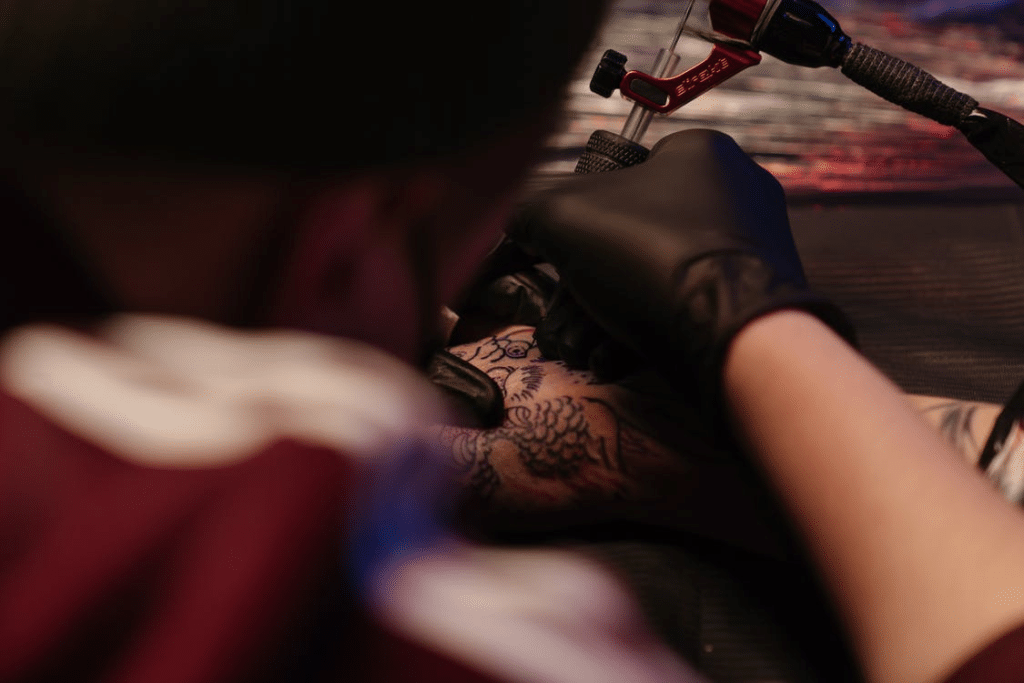
Source: pexels.com
Tips for Your First Tattoo
If you’re reading this article, you are probably on your way to getting your first tattoo. Here are some tips that you might find helpful:
Pain Levels
You will feel different levels of pain depending on your pain tolerance, the size of the tattoo, and where it is placed. More nerves are present in areas with fewer muscles, so tattoos hurt more around such areas. On the other hand, if you have steel skin, you probably won’t feel anything. In addition, if you select a meatier location, such as your bicep or thigh, your results will be even better.
As the area becomes fleshier, the less pain it will cause. There’s going to be some discomfort no matter where you place it, but most artists and tattoo enthusiasts agree that the following areas hurt the most:
- neck
- forehead
- ribs
- spine
- hands (especially palms)
- fingers
- ankles
- feet
Depending on the tattoo design you are getting, what you feel on your skin may vary. Here are some of what you may feel and why they occur:
- Scratching. Tattoos that require shading are more likely to experience this problem. Shading uses multiple needles going through an area of skin to cover it with ink. Thus a scratch-like feeling can be felt.
- Sharp stinging. Tattoos on wrists and areas with tighter skin may also experience this, although it usually occurs with detailing.
- Burning sensation. The needle goes back over the same spot repeatedly, so this is the most common sensation. There is nothing worrying about this, but you may ask your tattoo artist to pause for a while if it gets too much.
- Vibrating sensation. It is more likely to happen with tattoos on bonier areas, such as your ribs or feet. This comes from the vibrating tattoo machine.
How to Deal with Tattoo Pain?

Source: pexels.com
The first step to reducing the pain of a tattoo is to find a qualified and experienced artist. Someone with little experience is likely to cause more pain than someone who has been tattooing for years. The next step is to prepare for the tattoo. This means avoiding caffeine and alcohol before the appointment, as well as eating a light meal. It is also helpful to arrive well-hydrated.
An anaesthetic or numbing cream can be applied to the skin before the tattoo begins. This will help numb the area and reduce pain. Some people find that breathing deeply and focusing on something else helps distract from the pain of the tattoo needle.
Conclusion
In conclusion, tattoos are a big decision. But with proper research and preparation, you can go into your tattoo appointment feeling confident and excited. Follow these tips, and you’re sure to have a great experience!
FAQs
What should I not do before getting a tattoo?
When it comes to tattoos, there are a few things you should avoid before getting inked. For starters, don’t drink alcohol or take drugs. Both can thin your blood and increase the risk of bleeding during and after your tattoo appointment. Secondly, avoid sun exposure. Sunburns can cause skin irritation and make the healing process more difficult. Finally, don’t go on a diet. Being underweight can also lead to problems with healing. So, if you’re thinking about getting a tattoo, make sure to avoid these things beforehand!
What can I take before a tattoo to ease the pain?
There are a few things you can take before getting a tattoo to help ease the pain. Ibuprofen is one of the most common and can be taken up to four hours before the appointment. Taking a hot bath or shower before the appointment can also help loosen up the skin and make it easier for the artist to work. And finally, having a positive attitude can go a long way in making the experience less painful.

